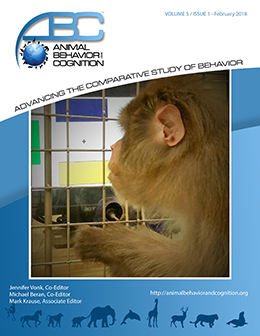Vol 5, Issue 1, February 2018
Can Surprising Nonreward and Adjunctive Behavior Influence Each Other?
Citation
Rick, P., Donaire, R., Papini, M.R., Torres, C., & Pellón, R. (2018). Can surprising nonreward and adjunctive behavior influence each other? Animal Behavior and Cognition, 5(1), 139-153. https://doi.org/10.26451/abc.05.01.10.2018
Abstract
Adjunctive or schedule-induced behavior can be defined as an increase in the frequency of a behavior under conditions of intermittent reinforcement. Adjunctive behavior has been explained as developing from reinforcement contingencies and emotional responses of frustration due to periods of reward omission, among other accounts. Two experiments with rats were designed to test the hypothesis that frustration mediates adjunctive behavior. According to this hypothesis, extensive training under conditions involving both reward and reward omission (e.g., partial reinforcement and intermittent reinforcement) promote frustration counterconditioning, a mechanism activated when reward omissions are followed by reward. Frustration counterconditioning reduces avoidance and enhances approach, inducing behavioral persistence that transfers across situations inducing frustration—a mechanism yielding transsituational transfer. In Experiment 1, Phase 1 involved runway training under continuous vs. partial food reinforcement, whereas Phase 2 involved exposure to a fixed-time 60-s schedule of intermittent food reinforcement with free access to a wheel. Counterconditioning of goal approach in Phase 1 led only to a modest increase in wheel running in Phase 2. In Experiment 2, Phase 1 involved groups exposed to either intermittent reinforcement or massed-food control, both with access to a wheel, followed in Phase 2 by runway training under continuous reinforcement and extinction. No support was found for a transfer effect. The results are discussed in relation to accounts of adjunctive behavior based on Amsel’s frustration theory and Killeen-Pellón’s reinforcement theory of adjunctive behavior.
Keywords
Instrumental running, Schedule-induced running, Transfer, Frustration, Counterconditioning, Running-food proximity
